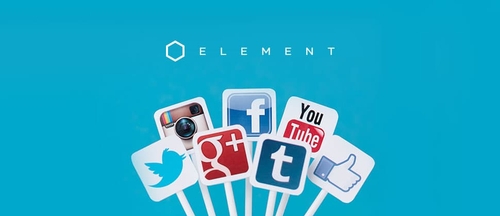To tag or not to tag? Element’s social media experts debate it out.
[2017 Hashtag Debate, Annotated] Greetings from the Element offices at 2081 Profit Place in De Pere. I’m Canuck J. Moose of noted mascot fame, and I welcome you to the inaugural hashtag debate. We came up with a debate-specific hashtag, but couldn’t decide if we should use it or not.
Our team has designed the format: unlimited heated answers to the big question …
Hashtags: Yea or nay?
Both campaigns have agreed to these rules. The audience has pinkie-promised to remain silent. No cheers, boos, expletives, or other interruptions will be permitted, particularly from former offenders named Mike.
Please welcome our panel of experts:
Derek Blaszak, Digital Marketing General, Pro
Molly Wentworth, Office Hub/Proofing Prof, Anti
Kate Shropshire, Digital Marketing Whiz, Pro
Kayla Marcoe, Office Nerve Center/Most Detail-Oriented Person Alive, Anti
Kasey Steinbrinck, Content Marketing Czar, Anti
Bree Gaber, Content Marketing Guru, Anti
Shelby Bake, Social Media Scholar, Pro
Let’s hear from our experts. Keep it clean, guys.
Derek: I am 💯% #prohashtag. They enable the good people of the world to find similar content, follow trending topics, and engage with event coverage in real-time. And, let’s not forget the accidental-but-prominent use, which is to convey thoughts or feelings associated with content. It may be more suitable in a B2C setting, but still a creative way to convey a message.
Also, every good party needs a solid hashtag. Hashtags are kind of like a global party. With a popular hashtag, I can host a party with millions of my closest internet friends. #inappropriatefuneralsongs was the best.
I will concede that the jury is still out on formatting and capitalization. I say, just keep it consistent.
Molly: Let’s preface this: I don’t do social. But, my personal stance is that I don’t see a point to them, other than to be pointedly funny (see Derek’s Instagram). I have never clicked on a hashtag to see what other people have posted about a topic, because, frankly, I don’t care what strangers are posting about. The only time I’ve clicked on a hashtag was when a tag was associated with my friend’s bachelorette party.
Hashtags seem to work for photo contests (i.e. the Packers #GGFriday) and can help spread the word. Contests are the only reason a business should use hashtags.
Kate: I am proud to be pro-hashtag … when the situation is right.
Like my colleague Derek mentioned, they help users find content they’re interested in. When viewing content, I can search a hashtag and find similar photos and videos about that same topic. For example, when I’m trying to decide what to order at a restaurant, I can find photos taken by past patrons. Did I choose my food, or did Instagram do it for me? We may never know.
Hashtags can also connect offline and online campaigns, such as in signage that encourages users to post photos at an event, or in a hashtag related to a reality TV finale that connects users over their shared guilty pleasure show.
As social media marketers, we love hashtags because they drive engagement. Instagram posts with one or more hashtags receive 12.6% more engagement on average.
In the right setting, hashtags are useful, funny, and help social posts garner attention. In the wrong setting, I’m more anti-hashtag. The wrong setting includes the use of verbal hashtags … if everyone stopped saying “hashtag” in casual conversation, I would sleep better at night.
Kayla: I must get back to being the most detail-oriented person alive, so I’ll make my statement brief. Hashtags are only useful to me when I want to say something that’s too sassy for plain prose. I never search for them on social media platforms.
Kasey: I lean towards the anti-hashtag camp. The original use of hashtags has been adulterated and vilified by hashtag abuse. This abuse is a result of the fact that most social media users don’t understand how to use hashtags. I could continue at length about these offenders, but the two most common (and annoying) abusers are those that New York Magazine’s “The Cut” labeled “hashtag stuffers” and “hashtag stringers.”
Hashtag stuffers are people who cram way too many hashtags into a post. When there are more hashtags than normal text, you’re an offender. Example: someone posts a family Christmas photo on Instagram and writes, “This is what it’s all about!” They adorn this seemingly well-meaning post with the hashtags, “#christmas #familytime #specialmoments #holidaymemories #santaclausiscomingtotown #babyjesusrules.” That’s too much, man! Nobody needs that many hashtags.
Canuck: I believe what Kasey’s saying is, “get woke, people.”
Kasey: Darn tootin’, Mr. Moose. Hashtag stringers somehow came to believe that putting a hashtag on a lengthy phrase was an acceptable way to express inner thoughts and emotions or irony. For example, a flustered parent may complain on Facebook about struggles at home with the hashtag #thishouseissomessyiamlosingmymind.
Citizens, you must ask yourselves: if your hashtag is a run-on sentence, should it be a hashtag at all? Answer: It’s not clever. It’s just hard to read. And, the probability of anyone else using that same hashtag is a billion to one (Source: Kasey, just now). So, what’s the point?
From a marketing perspective, hashtags can be useful for gathering an audience around a trending topic or current event. Brands should be careful, however, to make sure they don’t get burned by their own hashtags. There are plenty of failures involving unfortunate word combinations and brand bashing. Just ask Susan Boyle about her album party (#susanalbumparty), or tweet at McDonald’s to get their feedback on how the #McDStories campaign turned out. #theprosecutionrests
Bree: Hashtags can work, but it really depends on the channel and relevance of the hashtag.
Hashtags are best used on Instagram and Twitter, but not as effective on Facebook. My rationale is that Facebook didn’t originally support hashtags, so users are less likely to use them because the behavior isn’t ingrained in their Facebook user behavior.
If you’re going to use a hashtag, make it relevant to the conversation. Strive for something people will follow and search for. You’ll see people using hashtags to say something they don’t necessarily want to write in their post like #boring or #selfie, but honestly … who clicks on that or wants to see someone’s selfie? It’s the same for businesses.
I agree with my respected colleague, Kasey, when it comes to an overabundance of hashtags. Stop the abuse!
Shelby: Slow your roll, hashtag haters. At best, hashtags aggregate conversations across the world and expose social media users to a variety of opinions they won’t find elsewhere. With a simple click of a hashtag, users can get outside their filter bubble. As Kate stated, hashtags can connect online and offline campaigns and make efforts easily trackable for marketers. HubSpot says,
“They can give people useful context and cues for recall, aggregate posts and images together, and update a group of like-minded individuals on certain a topic in real time.”
At their worst, they are archaic or trite. Archaic because most social platforms are mini search engines, and users can find any word, hashtag or not, using the search bar. Trite because many users will use hashtags as a joke or an aside, and it’s overdone, #amiright?
Nope, you’re not right. Folks, we’re still using a mini floppy disc as the “save” icon in modern word processors, and according to Wikipedia, floppies officially died in 2006 (#RIP). Just because the use of something has evolved beyond its originally intended use does not mean that something is inherently less meaningful. If a snarky hashtag makes your best friend laugh, great. If a hashtag unites a community or advances women’s rights, even better.
Finally, hashtags must be capitalized to be readable. It’s #MerryHexmas, not #merryhexmas (see #susanalbumparty).
With that, it’s time for closing statements. #WrapItUp
Derek: #hashtagorbust #micdrop #byefelicia
Molly: Derek, is that “hashta gorbust?” #OldSchool #HowDoesThisThingWork #AintNobodyGotTimeFoThat
Kate: #prohashtag #contextiskey
Kayla: *crickets*
Kasey: I destroyed y’all. #noughsaid
Bree: Hashtags are useful only when they are both interesting and significant.
Shelby: “If you can’t handle me at my worst, then you sure as hell don’t deserve me at my best.” – Hashtag Monroe
Debaters, thank you for participating. While millions have already voted with their use of hashtags, the debate rages on. Cast your vote by reaching out to us on Facebook, then see what else we have to say about social media on our blog. Does your business need help with social? Our team handles that with finesse (regardless of their personal hashtag stance).
And so, goodbye, and may Santa bless the United States of America. #blessed








